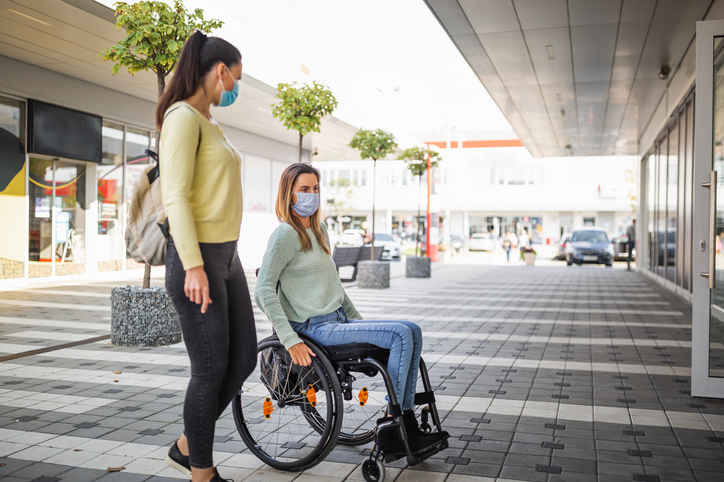COVID-19
The COVID-19 pandemic should be of utmost concern to every lawmaker in the country.
Below are some resources and actions advocates can take to support people with disabilities’ needs and concerns so they are adequately addressed in COVID-19 efforts.
Disability in the Time of Covid-19: A Storybook
Key recommendations that emerged from the interviews include:
- Increase funding for Home and Community Based Services (HCBS).
- Sustain and expand the Emergency Broadband Benefit established under the CARES Act to build towards inclusive digital infrastructure.
- Reform public benefits to promote financial security and resilience, not poverty.
- Provide Personal Protective Equipment (PPE) and secure higher wages for Direct Support Professionals.
Read the stories in Disability in the Time of COVID-19 on our interactive online storybook.
COVID-19 and the Disability Vote
AAPD’s report on COVID-19 and the Disability Vote explores the impact of the COVID-19 pandemic on voting accessibility. Created in collaboration with many disability and voting rights advocates, the report provides key policy recommendations to ensure that voters with disabilities have full access to our democracy in 2020 and beyond. Below are some of actions that AAPD calls for at the local, state, and federal levels of government:
- Make sure all voters can register to vote and cast a ballot remotely.
- Allow voters with disabilities to receive and mark their ballot digitally.
- Make in-person voting safe and accessible with early voting, curbside voting, and more.
- Educate voters on voting rights, options, and safety in multiple and accessible formats.
- Ensure voters in congregate settings can register to vote and cast their ballot.
- Explore, innovate, and test electronic voting methods.
- Ensure states have the funding needed to make voting safe and accessible this election.
Changes in the U.S. Postal Service
People with disabilities rely on the U.S. Postal Service (USPS) to receive important information and necessities, such as prescription medications and medical supplies, bills and notices, paychecks and benefit checks, and social communication. Additionally, many people with disabilities vote by mail in elections as a way to exercise their most fundamental and sacred right to vote while reducing the risk of exposure to coronavirus.
The National Council on Independent Living (NCIL) and AAPDare deeply concerned about reports of delays in deliveries and reduced capacity of the USPS. The recent changes in operations of the USPS and the resulting delays pose a threat to the equal participation of people with disabilities in our communities, our health, and our civil rights.
AAPD and the NCIL collected stories of people with disabilities impacted by the recent USPS changes. We collected over 100 stories and sent a sample of them with this letter to House Leadership and members of the House Oversight Committee in advance of their hearing on the USPS on August 24, 2020.
AAPD Community Call on COVID-19 Crisis
On Friday, April 3 AAPD hosted a teleconference focused on the legal non-discrimination obligations for healthcare providers during the COVID-19 crisis. The teleconference addressed legal rights for people with disabilities in health care settings, current practices related to people with disabilities in medical triage, and recommendations to prevent medical rationing and disability discrimination. Featured presenters and experts were:
Ted Kennedy, Jr., Board Chair, American Association of People with Disabilities and Law Partner, Epstein Becker Green.
Panelists:
- Kara Ayers, Ph.D., Associate Director, UCEDD, Division of Developmental and Behavioral Pediatrics Assistant Professor, UC Department of Pediatrics Cincinnati Children’s Hospital
- Samuel Bagenstos, Professor of Law, University of Michigan
- Jennifer Mathis, Policy and Legal Director, Bazelon Center for Mental Health Law
- Silvia Yee, Senior Staff Attorney, Disability Rights Education and Defense Fund
Review the transcript and recording of the call.
